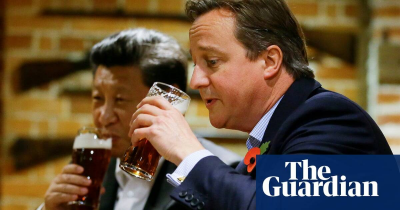The Guardian - China-Concerns as China welcomes David Camerons return as foreign secretary
November 15, 2023 4 min 826 words
这则报道揭示了对于英国前首相戴维·卡梅伦成为英国外交大臣的担忧。报道指出,中国官方媒体对卡梅伦的任命表示欢迎,认为他可能在修复英中关系和推动英国脱欧后外交布局方面发挥建设性作用。然而,批评者担忧,卡梅伦与“英中关系黄金时期”紧密相关,其在过去与中国保持联系的务实态度可能与保守党当前日益强硬的立场相悖,面临更为复杂的地缘政治局势。报道还指出,卡梅伦在卸任首相后继续与中国保持联系,特别是领导了一项价值10亿美元的英中投资基金,引发了对英中关系的批评。总体而言,这次任命引发了对英中关系未来走向的关切,尤其是在保守党内部立场逐渐强硬的背景下。
Chinese state media have welcomed the appointment of the former prime minister David Cameron as the UK’s foreign secretary, as opponents of Beijing raised concerns about the return of a figure closely associated with the “golden era” of UK-China relations.
In an editorial published on Tuesday, the Chinese state tabloid the Global Times said Cameron “could potentially play a constructive role, both in mending the UK’s relations with China and in rebuilding and advancing the UK’s post-Brexit diplomatic landscape”.
It added: “But Cameron’s pragmatic approach toward China in the past may be at odds with the Tories’ increasingly hardline stance today, and he now faces a tenser and more complex geopolitical situation.”
At the Chinese foreign ministry’s regular press briefing on Tuesday, spokesperson Mao Ning was more muted, declining to answer a question about whether Cameron was a friend of China.
Cameron was the UK’s prime minister between 2010 and 2016. Often referred to as the “golden era” of UK-China relations, there was a deepening of economic ties between the two countries. When the Chinese leader made a state visit to the UK in 2015 – a much-documented trip, with Cameron and Xi sharing pints and taking selfies – the leaders inked an estimated £30bn of trade and investment deals.
One of the most significant developments of that visit was the decision to allow Chinese involvement in the UK’s civil nuclear programme. China General Nuclear Power Corporation (CGN), a state-owned energy group, agreed to invest £6bn in Hinkley Point C, the first new nuclear power plant to be built in the UK in nearly 30 years. CGN also took a 20% stake in Sizewell C nuclear project.
Last year, Rishi Sunak declared the golden era of UK-China relations to be “over”, as the British government bought out CGN’s stake in Sizewell. The future of Hinkley Point also looks uncertain as British lawmakers are increasingly concerned about the security implications of Chinese investment in the UK’s critical infrastructure.
Since leaving office, Cameron has continued to engage with Chinese interests, behaviour that has attracted criticism from the increasingly vocal figures in British politics who are critical of the UK having a close relationship with China.
One of Cameron’s early post-Downing Street ventures was leading a $1bn UK-China investment fund, which aimed to boost UK involvement in China’s belt and road initiative projects, among other trade and investment deals. It was later revealed that in 2017, 15 months after leaving office, Cameron met the then-chancellor, Philip Hammond, to discuss Hammond’s support for the fund, despite the convention that former prime ministers should wait two years before engaging in lobbying activities.
Nonetheless, the fund struggled to get off the ground as relations between Beijing and London soured, particularly after the UK’s criticism of the crackdown on the pro-democracy movement in Hong Kong.
In 2021, the Financial Times reported that Cameron had “all but given up” on the fund.
Cameron has also attracted criticism for his support for Chinese investment in a port project in Sri Lanka. In September, he spoke at two events in the United Arab Emirates that were aimed at drumming up investment in Colombo Port City, a special economic zone in Sri Lanka being developed by China Harbour Engineering Company, a subsidiary of a state-owned engineering firm.
after newsletter promotion
Cameron’s spokesperson said the talks were booked by KPMG Sri Lanka and that Cameron had “not engaged in any way with China or any Chinese company about these speaking events,” Politico reported.
Luke de Pulford, the director of the Inter-Parliamentary Alliance on China, said Cameron had been “shilling for the UK’s biggest security threat” and that his appointment was “a strategic own goal for Rishi Sunak”.
But despite the increasingly hawkish political atmosphere in the UK, the trading relationship with China has improved in the past five years. Between 2017 and 2022, the value of the UK’s trade with China has increased from £71.3bn to £112.6bn, although the UK has dropped down the list of China’s biggest trade partners in that period.
In the Global Times editorial, Chinese academics expressed concern that despite Cameron’s appointment, the Conservative party would be “more inclined to be tough on China”, even if that worked against British interests.
Cameron is not the only former British prime minister to have maintained a relationship with China. Last month, Tony Blair travelled to Beijing to meet the Chinese foreign minister, Wang Yi, in a visit that was not publicised in advance. According to a Chinese readout of the meeting, Blair promised that “the Labour party is willing to strengthen dialogue with the Chinese side”.

